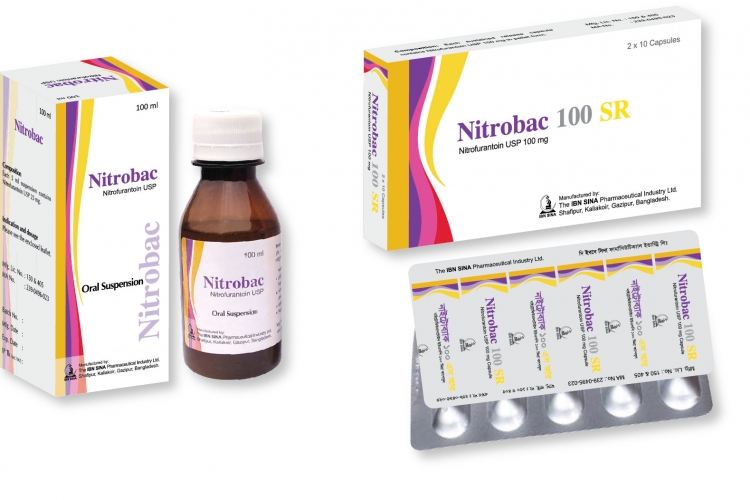
NITROBAC
NITROFURANTOIN USP
| NAME | STRENGTH | PACK SIZE | DOSAGE FORM |
|---|---|---|---|
| NITROBAC CAPSULE | 100 MG | 20 S | CAPSULE |
| NITROBAC SUSPENSION | 25 MG/5 ML | 100 ML | SUSPENSION |
Nitrobac 100 SR Capsule: Each sustained release capsule contains Nitrofurantoin USP 100 mg.
Nitrobac Suspension: Each 5 ml suspension contains Nitrofurantoin USP 25 mg.
Nitrofurantoin is an antibacterial agent speci¬c for urinary tract infections. It is highly soluble in urine, to which it may impart a brown color. Nitrofurantoin acts usually as a bacteriostatic antimicrobial, but may be bactericidal depending on the concentration of the drug and the susceptibility of the organism. The mechanism of antimicrobial action is unique among antibacterials. Nitrofurantoin is reduced by bacterial flavoproteins to reactive intermediates, which inactivate or alter bacterial ribosomal proteins and other macromolecules. Nitrofurantoin has greater antibacterial activity in acidic Environments.
Nitrofurantoin is indicated only for the treatment and prevention of acute uncomplicated urinary tract infections caused by susceptible strains of Escherichia coli or Staphylococcus saprophyticus.Nitrofurantoin is also active against several other gram negative and some gram positive organisms like Klebsiella, Enterobacter, Enterococci, Staphylococcus aureus and epidermidis, Citrobacter, Salmonella, Shigella, and Corynebacterium.
Nitrofurantoin should be given with food to improve drug absorption and, in some patients, tolerance.
Furantin 100 SR Capsule: Adults and children over 12 years: One capsule every 12 hours for seven days.
Genito-urinary surgical prophylaxis - One capsule twice daily on the day of the procedure and for next 3 days
Furantin Suspension: Adults: 50-100 mg four times a day - the lower dosage level is recommended for uncomplicated urinary tract infections.
Pediatric Patients: 5-7 mg/kg of body weight per 24 hours, given in four divided doses (contraindicated less than one month of age).
For Pediatric Patients, suspension should be given as per following table:
Body Weight (kg) No. of Teaspoonfuls (4 Times Daily)
7 to 11 ½ (2.5 ml)
12 to 21 1 (5 ml)
22 to 30 1½ (7.5 ml)
31 to 41 2 (10 ml
For long-term suppressive therapy in adults, a reduction of dosage to 50-100 mg at bedtime may be adequate. For long-term suppressive therapy in pediatric patients, doses as low as 1mg/kg per 24 hours, given in a single dose or in two divided doses, may be adequate.
Anuria, oliguria, or signifi¬cant impairment of renal function creatinine clearance under 60 ml per minute or clinically signi¬ficant elevated serum creatinine) are contraindications. Nitrofurantoin is contraindicated in patients with a previous history of cholestatic jaundice/hepatic dysfunction associated with Nitrofurantoin. Nitrofurantoin is also contraindicated in those patients with known hypersensitivity to it.
Patients should be instructed to complete the full course of therapy; however, they should be advised to contact their physician if any unusual symptoms occur during therapy. Diarrhea is a common problem caused by antibiotics which usually ends when the antibiotic is discontinued. Patients should be advised not to use antacid preparations containing Magnesium Trisilicate while taking Nitrofurantoin.
The most common side effects are nausea, headache and flatulence. Other side effects are diarrhea, dyspepsia, abdominal pain, constipation, emesis, dizziness, drowsiness etc.
Pregnancy: Pregnancy category B. It should be used during pregnancy only if clearly needed.
Lactation: Nitrofurantoin has been detected in human breast milk in trace amounts. Because of the potential for serious adverse reactions from Nitrofurantoin in nursing infants under one month of age, a decision should be made whether to discontinue nursing or to discontinue the drug, taking into account the importance of the drug to the mother.
Co-administration of Nitrofurantoin with antacids containing Magnesium Trisilicate reduces both the rate and extent of absorption. Uricosuric drugs, such as Probenecid and Sul-finpyrazone, can inhibit renal tubular secretion of Nitrofurantoin.
Occasional incidents of acute overdosage of Nitrofurantoin have not resulted in any specifi¬c symptoms other than vomiting. Induction of emesis is recommended. There is no speci¬c antidote, but a high fluid intake should be maintained to promote urinary excretion of the drug.
Store in a cool and dry place, protected from light and moisture. Keep out of reach of the children.
Nitrobac 100 SR Capsule: Each box contains 20's capsules in Alu-alu blister pack.
